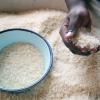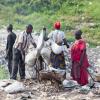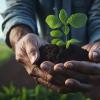
The African continent faces a multitude of challenges, and food security is among the most pressing. New research by an international team of researchers sheds light on the challenges and opportunities facing the African continent in securing sufficient food supplies with a particular focus on rice.
Africa has seen a significant increase in the consumption of rice as a staple food. The demand for rice has in fact experienced a fourfold increase, rising from approximately 10 million metric tons (Mt) to 40 Mt between 1990 and 2018. This surge in demand can be attributed to rapid population growth and changes in dietary preferences. Despite some progress in improving yields, Africa's rice production has not kept pace with the rising demand, leading to a growing reliance on imports for meeting the continent's rice needs. Consequently, African nations have been adopting rice self-sufficiency policies and development strategies to mitigate related vulnerabilities. While there is a general agreement that an increase in extreme weather events or climatic anomalies is a much bigger threat to future food security than gradual climate changes, the majority of studies to date have focused on the latter. This hinders their utility in policymaking and does not provide a full picture of the issues at stake. Meanwhile, the vulnerability of Africa to local or external supply shocks – and how this is challenged in the future is rarely mapped out, even though this has been detrimental in the past.
To address these issues, researchers developed a unique modeling framework that allows a consistent way to analyze the effects of gradual climate change and the corresponding year-to-year anomalies on future rice consumption, thereby accounting for the specific import-dependent context of the African continent, where climatic anomalies are also propagated through trade. The resulting study, published in Nature Food today, unveiled critical insights into the future of the African rice system and the challenges it faces, highlighting the urgent need for robust policies that consider socioeconomic and climatic factors to ensure food security and resilience in Africa.
"We wanted to explore how African rice production and consumption dynamics will develop under future socioeconomic and climatic futures when also considering year-to-year effects and the strong import-dependency of the continent. Although we restricted ourselves to rice, this framework could also be applied in different contexts," explains study lead author Koen De Vos, a guest researcher in the IIASA Biodiversity and Natural Resources Program who is also associated with the University of Leuven (KU Leuven) in Belgium.
"Apart from our results, it is particularly the methodology we used that is novel. Our study presents an innovative methodological framework that allows for the assessment of consumer responses to year-to-year climatic anomalies, including those occurring in providing regions," adds IIASA Biodiversity and Natural Resources Program Director, Petr Havlík, one of the study’s coauthors.
The results show that socioeconomic developments have a more substantial influence on rice availability in Africa compared to gradual climate change. However, climatic anomalies pose a significant threat to the stability of rice consumption. Consumer responses to anomalies are of much larger magnitude than those to gradual changes. For instance, in the Economic Community of West African States (ECOWAS) region, gradual climate change leads to a maximum 2% increase in rice prices, while negative climatic anomalies could result in price increases of up to 30%.
In addition, the findings indicate that rainfed production systems are more vulnerable to climatic anomalies than irrigated production systems, and that regions relying on self-production are not immune to consumption shocks, as they are more susceptible to local climatic variations. Conversely, regions dependent on imports are vulnerable to foreign climate variability.
The research also revealed unexpected results, as the minor effects of gradual climate change were initially surprising. However, the authors explain that these findings can likely be attributed to CO2 fertilization offsetting negative effects on rice productivity and the capacity of the model they used to account for management adaptations. The shift observed from rainfed to irrigated systems under climate change indicates that shifting to irrigation is an efficient adaptation strategy.
The authors caution against relying solely on rice self-sufficiency measures as a robust solution to enhance resilience against consumption shocks. The persistence of local climatic anomalies makes it imperative to diversify supply sources and improve storage capacities. Moreover, the authors advocate for agricultural development, emphasizing the efficiency of shifting from rainfed to irrigated systems to enhance resilience to climate change and climatic shocks such as droughts. However, this transformation must be undertaken sustainably and accompanied by improved access to credit and water resources.
In conclusion, the researchers emphasize the necessity of adopting a holistic approach to modeling future food systems, especially with a view on meeting the targets of the Sustainable Development Goals (SDGs) - in particular SDG 2, which is about creating a world free of hunger by 2030. They highlight the importance of integrating socioeconomic developments and climatic changes within the context of global change, and urge policymakers and stakeholders to consider these insights to inform future assessments and policymaking efforts.
Reference
De Vos, K., Janssens, C., Jacobs, L., Campforts, B., Boere, E., Kozicka, M., Havlík, P., Folberth, C., Balkovič, J., Maertens, M., Govers, G. (2023). Rice availability and stability in Africa under future socioeconomic developments and climatic change. Nature Food DOI: 10.1038/s43016-023-00770-5
News

15 April 2024
Collaborating to devise a strategy for organic waste management in Uganda

12 December 2023
Giacomo Falchetta receives the IAMC Best Online Poster Award

20 October 2023


